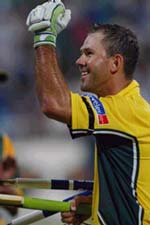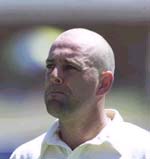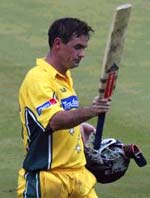Aus selectors temporarily vindicated
Daniel Laidlaw
In an ideal team, no individual is irreplaceable. A consistently successful
side needs have a system in place that ensures the continued prosperity of
the unit regardless of its individual members. To excel over a long period
of time requires a quality system, not necessarily an overflowing supply of
quality individual players. The Australian cricket team, it appears, has
such a system.
When Mark and Steve Waugh were sacked from the one-day team as the selectors
looked to the future, Australia lost a combined 569 games of ODI experience
(not to mention more than 250 Tests), its highest two all-time leading run
scorers, and an acclaimed, World Cup-winning captain. It was difficult to
imagine this not having some adverse affect on performances at least in the
short term, as some immediate difficulties were expected to be endured
before the long-term rewards were (hopefully) eventually reaped.
 However, the seamless transition to life after the Waughs in the one-day
series in South Africa has highlighted that the present strong Australian
team structure does not rely on individuals, however great. No player has
said it publicly out of respect to their Test leader and what he has
achieved, but from all appearances Australia have not missed Steve or Mark
Waugh in the slightest.
However, the seamless transition to life after the Waughs in the one-day
series in South Africa has highlighted that the present strong Australian
team structure does not rely on individuals, however great. No player has
said it publicly out of respect to their Test leader and what he has
achieved, but from all appearances Australia have not missed Steve or Mark
Waugh in the slightest.
So does this mean the Australian selectors were right, that Waugh's
captaincy was not that critical and he really was expendable? Not
necessarily. Actually, the fact Waugh has not been missed partly serves to
underline the successful legacy he has left.
While the immediate success of the team post-"Tugga" could indicate his
presence as both captain and batsman was over-estimated, it indicates
equally as much his enormous value. What kind of captain would Waugh have
been if his legacy to the team was for it to flounder in his absence? That
Australia have not missed him in its first series without him is actually a
credit to his leadership, not an indictment of it.
Unlike a dictator, which is how some have wrongly interpreted Waugh's
captaincy style, a great captain should be replaceable. Ideally, he should
have developed a culture that makes the progression of his successor
comfortable, able to smoothly continue a successful formula while
contributing his own individual style and ideas to the role. If Australia
could not survive without Waugh, then he really would not have done his job
properly.
In the short term, the selectors' decision to axe Mark and Steve Waugh has
been proven correct by Australia's 5-1 ODI series victory against South
Africa. Ponting has impressed and Hayden is gradually growing into his role
as limited-overs opener. However, it should be remembered their decision to
sack Waugh was not one made with the immediate future in mind but rather the
long term, including the World Cup, so it cannot yet be judged as a
judicious move.
The early signs are most definitely encouraging, as the one-day performances
surpassed all expectations, but nothing more definitive than that. How will
Ricky Ponting respond to a bad loss? How will his team perform when forced
to come from behind in a series? Can Maher, Watson or Hauritz stand the
pressure that only the World Cup or perhaps the elimination stages of the
Champions Trophy can bring? That is still to be discovered.
The selectors, though, have been temporarily vindicated. Australia won by
excelling in one facet of the game in each match, whereas South Africa
failed to merge a complete performance until the last game. The
psychological factor is one that could be argued endlessly, but it's
difficult to read just how much the Proteas were disturbed by the repeated
defeats. Outwardly, they showed a remarkable lack of concern at both the
margin and nature of the losses, in both Tests and ODIs. There should be no
correlation between Test and ODI performances, but after being unable to
defeat Australia in the first three one-day games, the continued losses
against the same team must have taken its toll.
In terms of performance, Australia were also proven a class above in the
ODIs, as South Africa were broken both by the pressure applied to them and
their own deficiencies. Australia won 8 of 12 ODIs against South Africa this
season, and for the series in RSA were without Bevan for three of the first
four games and Warne for all of the first four. Just how much of the
disparity was due to South Africa having regressed or simply Australia's
higher standard won't be known until they meet another team, but it's more
than likely the Proteas' winning ways will resume once they don't have to
face the Aussies.
In the first two games, South Africa's bowlers restricted Australia's
batsmen to moderate totals but their top order failed abysmally, while in
following five the batsmen flourished while the bowlers were often hammered.
Conversely, Australia began the series in potent form with the ball and had
some difficulties with the bat, before the batting fired spectacularly while
the bowlers and fielders struggled. Throughout, they were better than South
Africa in one facet of the game.
 The improvement in Australia's batting was made in significant part by 'new'
players Lehmann, Hayden and Maher, the former two the direct replacements
for Steve and Mark Waugh respectively. Ponting was effusive in his praise of
Lehmann, who despite only recently returning to the team is a vastly
experienced batsman, one of the most innovative one-day batsmen around and
ideally suited to the middle order. If anything, Lehmann has occasionally
been too inventive for his own good, but his confident flicks, nudges and
glides into the gaps saw attain a series strike rate of 91 and gave the
middle order impetus.
The improvement in Australia's batting was made in significant part by 'new'
players Lehmann, Hayden and Maher, the former two the direct replacements
for Steve and Mark Waugh respectively. Ponting was effusive in his praise of
Lehmann, who despite only recently returning to the team is a vastly
experienced batsman, one of the most innovative one-day batsmen around and
ideally suited to the middle order. If anything, Lehmann has occasionally
been too inventive for his own good, but his confident flicks, nudges and
glides into the gaps saw attain a series strike rate of 91 and gave the
middle order impetus.
In addition to his batting, Lehmann's innocuous but effective left-arm
tweakers proved an asset for a team without a genuine bowling all-rounder,
as he covered for bowlers who became expensive as well as being useful in
his own right. As one of the leadership group, Ponting went to Lehmann for
advice and one suspects Lehmann's relaxed, self-deprecating approach to his
cricket has also been beneficial to team spirit.
Hayden appeared to adopt a more traditional opener's role in one-day
cricket. Less free-scoring than Mark Waugh, he was also more consistent,
anchoring the innings on three occasions without converting his starts to
hundreds. When required, he did score quickly, as his 35 off 29 balls in the
record chase shows, and his partnership with Gilchrist appeared
complementary.
Maher made an outstanding return to international cricket, winning
consecutive MoM awards as a No. 3 and then at No. 6 for batting Australia to
a comeback tie in game three. After 152 runs in three innings for once out,
he was replaced by Bevan for game six, who was not even required until
Australia were 312/5 after 46 overs. Like Martyn a few years ago, Maher
appears a fine batsman to have in reserve. Bevan, Australia's premiere ODI
batsman, was hardly a factor in the series.
Australia's bowlers initially dominated the first two games, a fiery
Gillespie helping Australia defend totals of 223 and 226 with seven wickets.
The return to form of Lance Klusener was the only redeeming feature of South
Africa's batting as the likes of Gibbs, Kirsten and Kallis withered.
South Africa lost at least two early wickets in each of the first four games
but the tie in the third game marked an improvement in batting which
continued throughout the series as Jonty Rhodes emerged as South Africa's
best ODI batsman. His scores of 83, 56, 76, 71* and 39* through games three
to seven, all at better than a run a ball, injected life into each innings,
shaking off the earlier Australian containment with his improvisation and
hustle between the wickets. Kallis and McKenzie provided decent support and
Smith showed considerable promise after debuting in game four, but it did
not change the course of the series as the home side's bowlers lost control.
Ntini was easily South Africa's best bowler, the aberration of 1/83 in game
six notwithstanding, but he enjoyed little support. Even Shaun Pollock,
whose first spells remained generally economical, took just 9 wickets at an
economy rate of five per over.
 After Maher and Hauritz elevated the tourists to a tie in game three, the
batsmen took over, Ponting setting up a 3-0 lead with a majestic hundred in
game four, Gilchrist finally firing with a hundred in the next, sharing a
170-run opening stand with Hayden as Australia easily chased down South
Africa's 267, before the awesome yet ridiculously easy world record chase in
game six.
After Maher and Hauritz elevated the tourists to a tie in game three, the
batsmen took over, Ponting setting up a 3-0 lead with a majestic hundred in
game four, Gilchrist finally firing with a hundred in the next, sharing a
170-run opening stand with Hayden as Australia easily chased down South
Africa's 267, before the awesome yet ridiculously easy world record chase in
game six.
By that point, it seemed as if Australia almost enjoyed making it hard for
themselves, requiring a challenge to be inspired to new heights. Gilchrist
helped bludgeon 70 off the first 7 overs before a masterful, calculated
partnership of 183 between Ponting and Lehmann gave Australia control. It
was effectively over by the 35th over. Bevan, typically the catalyst behind
such a chase, was not seriously required. Afterwards, Ponting showed he was
more prepared to be publicly critical of his bowlers than Waugh, saying "a
few of the bowlers will be embarrassed by what happened to them." Presumably
the same will apply to the batsmen after game seven, when a revamped batting
order and South Africa's greater determination saw the Proteas record a
consolation victory.
While the batting order is settled, Australia are yet to find a reliable
all-rounder, with Harvey failing to progress and rookie Watson, more batsman
than bowler but scratchy in limited opportunties, still finding his feet. On
the bowling front, Lee remains explosive but is yet to master economy at his
pace, taking 9 wickets at 22 but conceding 5.82 per over.
South Africa's selection difficulties grew, particularly with regard to
their bowling attack. Beyond Pollock and Ntini, viable seam bowlers are
still competing for places, with Donald apparently on the outer, Hayward
returning from injury, Telemachus incisive but slightly expensive, and
Kallis increasingly ineffective. The series also saw stalwart Kirsten
replaced - at least temporarily - by Smith and Dippenaar dropped in favour
of McKenzie, until both were selected in the last game.
Whatever South Africa did, Australia for the most part had a superior answer
to it. After the hiccup in the home tri-series, the commanding performance
against the World Cup hosts on their home ground has the World Cup
preparation of Ponting's Australians fully on track. Steve Waugh should be
proud.
More Columns
Mail Daniel Laidlaw